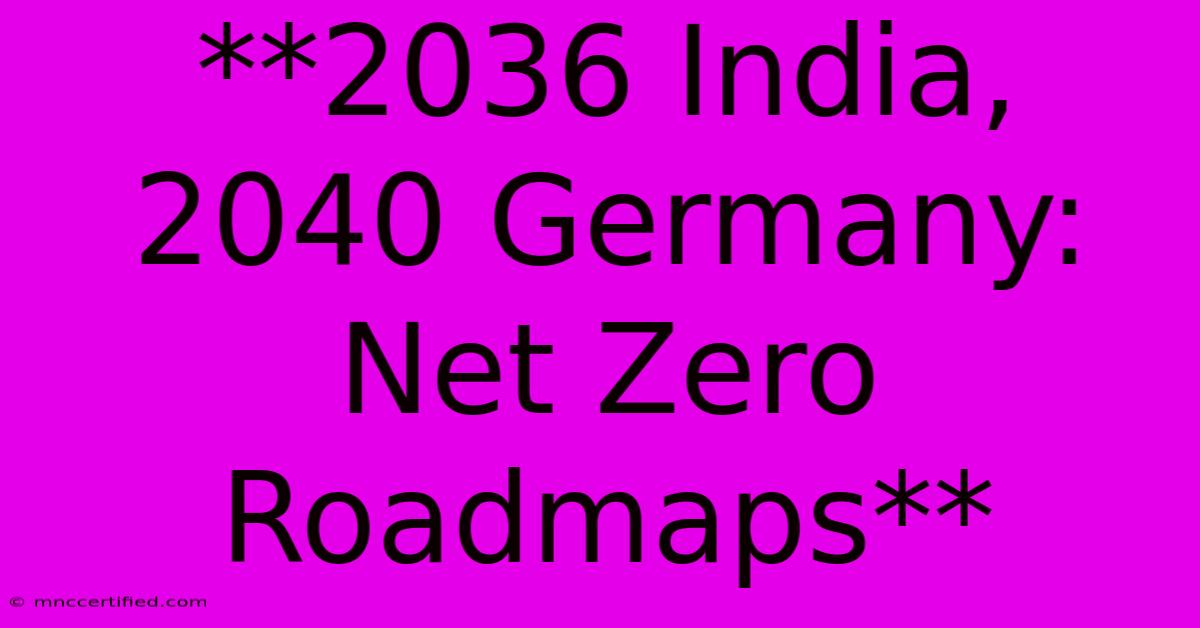**2036 India, 2040 Germany: Net Zero Roadmaps**

Table of Contents
2036 India, 2040 Germany: A Deep Dive into Net Zero Roadmaps
The world is grappling with the urgent need to combat climate change, and achieving net zero emissions is a critical step in this fight. While many countries have set ambitious targets, India and Germany are leading the way with their concrete plans and strategies. Let's take a closer look at their respective net zero roadmaps and understand the key elements that contribute to their success.
India's Journey to Net Zero by 2070
India, with its growing population and economic ambitions, faces unique challenges in achieving net zero. Yet, the country has laid out a comprehensive roadmap:
Key Highlights:
- Target Year: 2070.
- Focus:
- Renewable Energy: A major push towards solar, wind, and hydro power.
- Green Hydrogen: Developing a robust green hydrogen ecosystem for industrial decarbonization.
- Energy Efficiency: Implementing energy-saving measures across various sectors.
- Forestry and Carbon Sinks: Expanding forest cover and enhancing carbon sequestration capabilities.
- Sustainable Mobility: Promoting electric vehicles and clean public transport.
- Circular Economy: Embracing circular economy principles to reduce waste and resource depletion.
Challenges and Opportunities:
- Funding: Securing sufficient investment for renewable energy infrastructure and green technologies.
- Technology: Accelerating the development and deployment of cutting-edge clean technologies.
- Capacity Building: Investing in workforce training and upskilling to support the transition.
- Collaboration: Building international partnerships for knowledge sharing and financial assistance.
Germany's Net Zero Roadmap: Aiming for 2045
Germany, a pioneer in renewable energy, has set an even more ambitious goal: achieving climate neutrality by 2045.
Key Elements:
- Phased Approach: Transitioning from coal to renewable energy, with a complete phase-out of coal power by 2038.
- Energy Efficiency: A strong focus on energy efficiency across all sectors, including buildings and industry.
- Green Hydrogen: A key driver for industrial decarbonization, particularly in sectors like steel and chemicals.
- Carbon Pricing: Implementing an effective carbon pricing mechanism to incentivize emissions reductions.
- Climate Action Law: A legal framework that mandates ambitious climate targets and sets clear timelines for achieving them.
Challenges and Considerations:
- Energy Security: Ensuring a stable and reliable energy supply while transitioning away from fossil fuels.
- Industrial Transformation: Supporting industries to adapt to new technologies and climate-friendly practices.
- Social Impact: Addressing the potential job losses and economic challenges during the transition.
Comparing Approaches: India vs. Germany
While both countries have ambitious net zero targets, their approaches differ significantly.
- India: Focuses on a phased approach, prioritizing energy access and economic growth while transitioning towards cleaner energy sources.
- Germany: Emphasizes rapid decarbonization, aiming for a faster transition towards a low-carbon economy.
Global Collaboration and the Future of Net Zero
The success of India's and Germany's net zero roadmaps depends heavily on global cooperation. Sharing best practices, technology transfer, and financial assistance are crucial for accelerating the transition to a low-carbon world.
Key takeaways:
- Ambition: Both India and Germany have demonstrated a strong commitment to tackling climate change with ambitious net zero targets.
- Diversity: Their approaches highlight the different pathways and priorities that countries can take based on their specific circumstances.
- Collaboration: International cooperation is critical for achieving global climate goals and sharing knowledge and resources.
As we move towards a net zero future, these national roadmaps offer valuable insights and inspire other countries to develop their own comprehensive plans for a sustainable future.

Thank you for visiting our website wich cover about **2036 India, 2040 Germany: Net Zero Roadmaps**. We hope the information provided has been useful to you. Feel free to contact us if you have any questions or need further assistance. See you next time and dont miss to bookmark.
Featured Posts
-
Emsella Treatment Covered By Insurance
Nov 09, 2024
-
Levi Strauss Heir Daniel Luries Political Journey
Nov 09, 2024
-
Its An Honor Rashida Jones On Quincy
Nov 09, 2024
-
Peoples Security Life Insurance Company
Nov 09, 2024
-
Fistula Surgery Cost Without Insurance
Nov 09, 2024